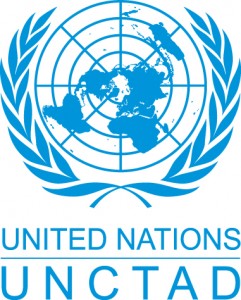Each week Emerging Markets ESG publishes an interview entitled, “Five Questions about SRI.” The interview features a practitioner’s insights about SRI in emerging markets and through Emerging Markets ESG shares this expertise with a wide global audience. The goals of Five Questions about SRI are fourfold:
- To reflect on what SRI in emerging markets means to practitioners;
- To collect a catalogue of examples of SRI in practice in emerging markets;
- To raise awareness about SRI in emerging markets; and
- To enable SRI practitioners in emerging markets to network with peers around the world.
This week’s interview is with Anthony Miller, Ph.D., Economic Affairs Officer, Investment and Enterprise Division, United Nations Conference on Trade and Development (UNCTAD).
Established in 1964, UNCTAD promotes the development-friendly integration of developing countries into the world economy. UNCTAD has progressively evolved into an authoritative knowledge-based institution whose work aims to help shape current policy debates and thinking on development, with a particular focus on ensuring that domestic policies and international action are mutually supportive in bringing about sustainable development. Anthony Miller is an Economic Affairs Officer with the United Nations Conference on Trade and Development (UNCTAD). Dr. Miller is a specialist on issues of corporate social responsibility and corporate governance, with special emphasis on how these issues impact developing countries. Working with partners at the PRI and the Global Compact, he is one of the organizers of the Sustainable Stock Exchanges initiative. Prior to joining UNCTAD, Dr. Miller was a consultant with the ILO and the High Commission for Human Rights. Before going into public sector work, he was an executive in the automotive industry with postings in China, India and Singapore. He holds a B.A. from Trent University, Canada, and an M.Phil. and Ph.D. from Cambridge University, England.
Emerging Markets ESG: How would you define socially responsible investment (SRI)?
 Anthony Miller: A text book style definition would be something like “RI is about investors leveraging corporate governance mechanisms to promote improved environmental and social practices among investee companies.” And that’s probably the way most people working in this area would think about it. This kind of definition though takes for granted the health of corporate governance mechanisms. Quite often, RI means first and foremost being engaged in strengthening corporate governance mechanisms to give shareholders more control over the companies that they own. Too often in discussions of ESG issues, attention drifts to the E and the S, while fundamental issues of corporate governance get neglected. Simple but important things like majority vote rules, these are critically important. Here we see many RI investors carrying forward some of the traditional corporate governance activism of previous decades.
Anthony Miller: A text book style definition would be something like “RI is about investors leveraging corporate governance mechanisms to promote improved environmental and social practices among investee companies.” And that’s probably the way most people working in this area would think about it. This kind of definition though takes for granted the health of corporate governance mechanisms. Quite often, RI means first and foremost being engaged in strengthening corporate governance mechanisms to give shareholders more control over the companies that they own. Too often in discussions of ESG issues, attention drifts to the E and the S, while fundamental issues of corporate governance get neglected. Simple but important things like majority vote rules, these are critically important. Here we see many RI investors carrying forward some of the traditional corporate governance activism of previous decades.
Emerging Markets ESG: What distinguishes SRI from mainstream investment?
Anthony Miller: The short answer to this question is “less and less every day” and by that I mean that RI really is becoming a mainstream practice. In our 2010 study of the top 100 pension funds in the world, we found that a majority of the AUM were in the hands of funds that displayed at least some RI practices.
Emerging Markets ESG: Which extra-financial theme – environmental, social or governance – is the most challenging for emerging market companies to manage?
Anthony Miller: One of things that emerges out of our work in this area is that the type of industry a company is involved in is a strong determinant of what issues are the most challenging. This is true of companies from emerging markets as well as developed countries. Some issues require more resources to address and there we can see challenges for emerging market enterprises. Addressing environmental issues often requires cutting edge technology that emerging markets will need to get from international firms via partnerships, licensing or FDI. This is something UNCTAD addressed in the 2010 World Investment Report, which examines what’s needed for a ‘low carbon economy’. In the area of corporate governance, the challenges vary tremendously from one emerging market to another. UNCTAD has done a number of studies of corporate governance disclosure in emerging markets, and we see some emerging markets such as Brazil or South Africa that have very good practices, indeed developed countries could learn some things from what is going on there. In many emerging markets however, disclosure around governance issues remains a serious challenge. I think many companies can do a lot more in this area. If you look at EM companies that list on the NYSE or the LSE for example, you will typically see quite good disclosure practices.
Emerging Markets ESG: Which extra-financial theme – environmental, social or governance – is the most challenging for investors in emerging markets to analyze?
Anthony Miller: Here I think the whole world shares a common problem. Despite a lot of work on ESG analysis in developed markets, somehow there were no great alarm bells about CDO’s before the financial crisis. Likewise there were no red flags waving about BP’s accident record in the US before the oil spill in the gulf. We should remember that BP – one single company – had the majority of all fines and incidents in the US before the Gulf oil spill – and this was public information. Despite all this, before the spill, BP had a very high ranking in the FTSE4Good for environmental practices. So this is clearly a challenge for ESG analysts and something that has never really been addressed in a satisfactory way. As we discussed in our report last year, ESG analysis has to move beyond a review of how a company reports, to a review of what a company reports; it has to move from an evaluation of processes and policies to an evaluation of impacts and progress. That’s difficult, I know, but that’s what we have to do. Otherwise this kind of analysis will not be worth much to investors and other stakeholders. With the methodology most ESG analysts have in place now, today’s number one ranking environmental company could be tomorrow’s BP.
Emerging Markets ESG: UNCTAD recently published a book entitled, “Corporate Governance in the Wake of the Financial Crisis.” The book includes analysis from leading organizations like UNCTAD, ICGN, IOSCO, OECD, World Bank and others. Has the crisis raised awareness in developing countries/emerging markets about the benefits of responsible investment/SRI policies and practices?
Anthony Miller: In the forward to the book Mervyn King makes the point that the financial crisis has made it clear to everyone that governance, strategy and sustainability have become inseparable. That non-financial issues matter. While policy makers clean up the mess from the financial crisis, there are other crises quietly ticking away in the background, issues such as climate change or biodiversity. Investors are becoming more aware of this. And so are many regulators. UNCTAD is one of the co-hosts of the Sustainable Stock Exchanges initiative, which brings together investors, stock exchange officials and policy makers to discuss how capital markets can promote sustainability. Out of these dialogues it has become clear that many developing country stock exchanges are making significant efforts to promote ESG issues. This is an important trend to watch. Also we see that ideas are starting to change away from an exclusive investor focus in corporate governance towards, as in the case of Germany, a focus on ‘stakeholders’. Another important development.
